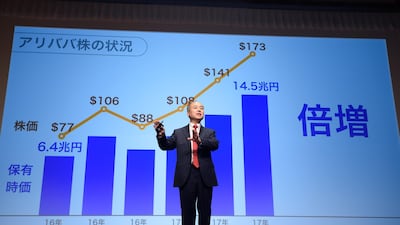SoftBank Group plans to invest as much as US$25 billion in Saudi Arabia over the next three to four years as the Japanese company run by Masayoshi Son deepens investment ties with the kingdom, according to people familiar with the matter.
SoftBank aims to deploy up to $15bn in a new city called Neom that crown prince Mohammed bin Salman plans to build on the Red Sea coast, the people said, asking not to be identified. The Japanese company’s Vision Fund also plans investments of as much as $10bn in state-controlled Saudi Electricity as part of efforts to diversify the utility into renewables and solar energy, the people said. SoftBank also will have some of its portfolio companies open offices in Neom, they said.
The plans by SoftBank would bolster the crown prince as he cracks down on alleged corruption via a purge that has rattled investors. The infusion of cash also would aid the country as it seeks to diversify its economy away from oil. To put the magnitude of SoftBank’s plans into context, all foreign direct investment in Saudi Arabia totaled $7.45bn last year, according to data from the OECD.
A representative for SoftBank declined to comment. A Saudi Electricity spokesman said the company didn’t have an immediate comment. SoftBank shares rose 1.6 per cent in Tokyo trading.
Shares in Saudi Electricity fell 0.3 per cent in Riyadh trading Wednesday, before Bloomberg News reported on SoftBank’s investment plans. The state utility has a market value of about $26.6bn after a 6.1 per cent increase in its share price this year.
______________
Read more:
IMF backs Saudi $500bn mega-city project
Softbank third quarter profits top estimates
Saudi's $500bn mega-city NEOM to be floated alongside Aramco, says crown prince
______________
Mr Son has been bolstering ties with Saudi Arabia since raising $45bn from the country’s Public Investment Fund for a $100bn fund this year. He was one of the main guests the wealth fund hosted at a conference in Riyadh in October that brought together titans of global finance seeking a piece of the action from the transformation of the economy. The Public Investment Fund did not immediately respond to a request for comment.
SoftBank’s Vision Fund may buy a significant stake in Saudi Electricity, according to a memorandum of understanding with the Saudi fund unveiled last month. Mr Son also has said he’s looking at making investments in Neom, without specifying the amount.
Saudi Arabia has said the Neom project will be backed by more than $500bn from the Saudi government, its sovereign wealth fund and local and international investors, according to a statement at last month’s business summit. The plan includes a bridge spanning the Red Sea, connecting the proposed city to Egypt and the rest of Africa. Some 25,900 square kilometres have been allocated for the development of the urban area that will stretch into Jordan and Egypt.
For SoftBank, the potential Saudi investments come as it expands from technology investments to asset management. The Tokyo-based company has used cash from its telecommunications operations to invest in everything from the UK semiconductor-design company ARM Holdings to the chat service Slack Technologies and the co-working giant WeWork. Mr Son now plans further acquisitions to potentially create a $300bn asset management arm, Bloomberg News reported in September.
SoftBank’s plans to merge Sprint with T-Mobile US were terminated this month. Mr Son said he ended the talks to combine the third and fourth-largest wireless operators in the US because he didn’t want to give up control of Sprint. A wireless telecommunications network will be critical to support investments that Mr Son plans to make via the Vision Fund.

